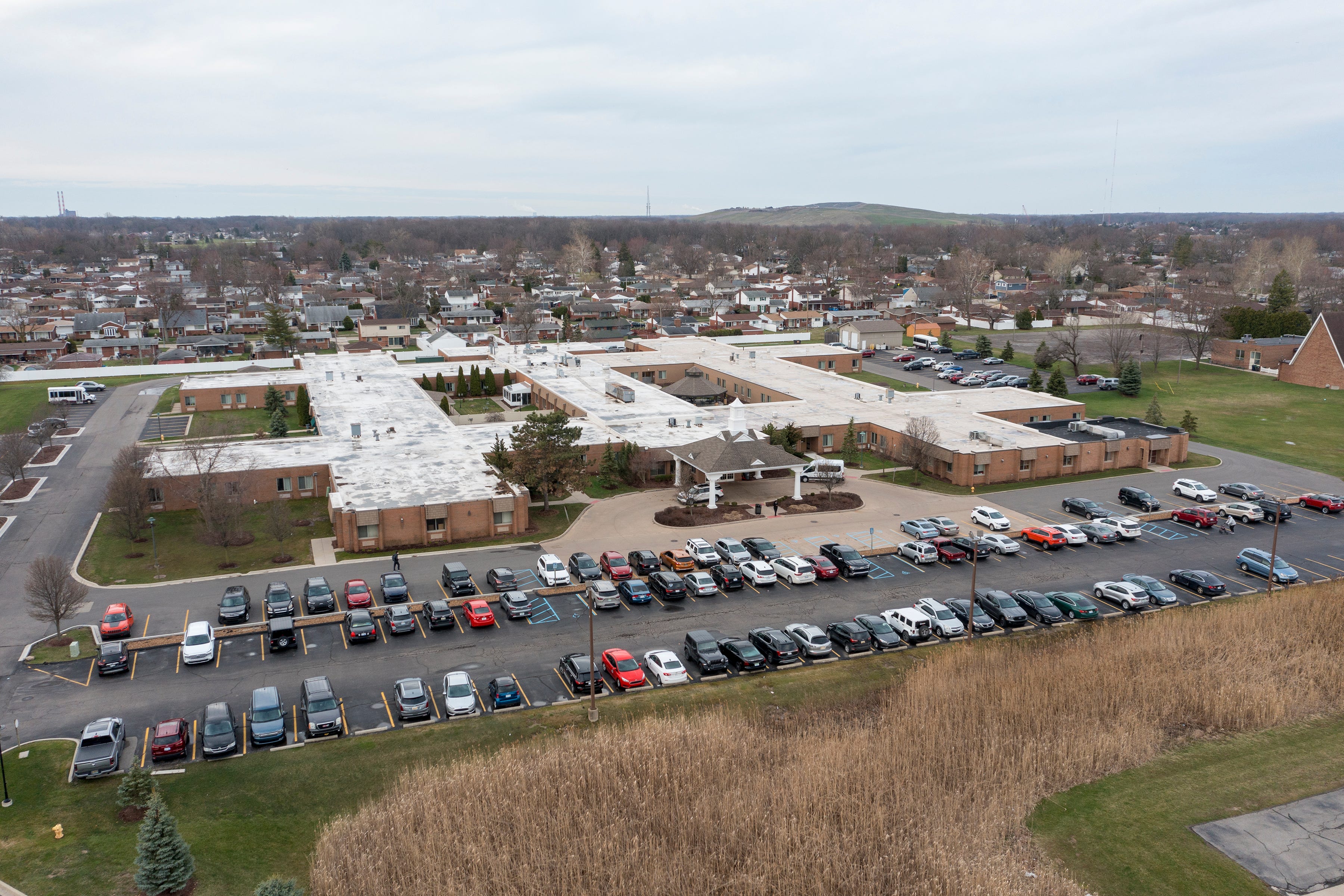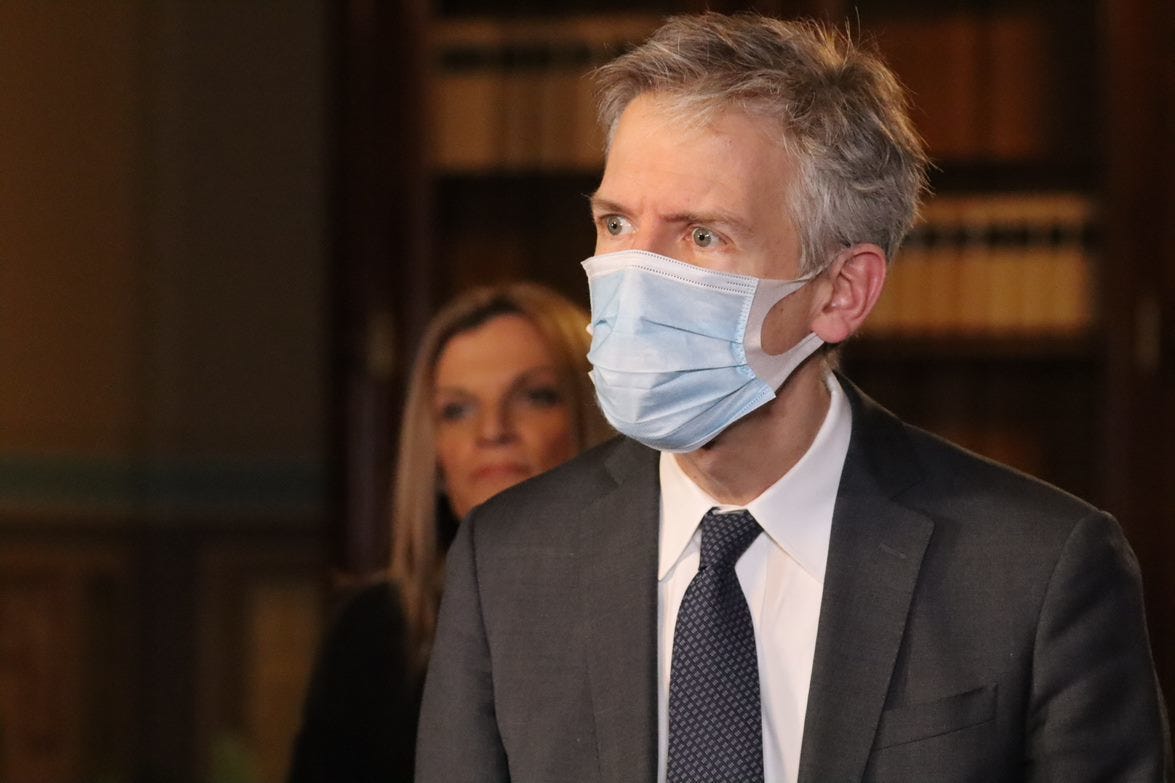March 10, 2020: Michigan reported its first cases of COVID-19. One of the individuals was an Oakland County resident. Another was a Wayne County resident. "It has moved into Michigan," Gov. Gretchen Whitmer said during a press conference on the evening of March 10, 2020.

March 13, 2020: In a letter, Melissa Samuel, president and CEO of the Health Care Association of Michigan, urged state officials to use empty facilities as quarantine centers to "avoid widespread infection" in nursing homes. "HCAM members have a number of facilities, including in Detroit and Southeast Michigan, that could be used for this purpose," Samuel wrote in the letter. Samuel also asked state officials to limit inspections and surveys to prevent the introduction of COVID-19 into the facilities.
April 9, 2020: An employee of Rivergate Health Care Center submitted a complaint to the Bureau of Community and Health System in Riverview that began, "Please help." The person, whose name was redacted from a document released to The Detroit News, said there had been seven to eight resident deaths with COVID-19-like symptoms within a four-day span. "What can we do to protect our health and the health of the residents we care for?" the person asked.

April 9, 2020: Ron Lammers, the fire chief in Riverview, submitted a complaint raising concerns about the number of emergency runs being made to Rivergate Terrace, which is part of the same complex of Rivergate Health Care Center. "Our run volume has increased drastically over the past couple weeks as well," Lammers wrote in his complaint. "Of the 29 runs, 21 were to Rivergate Terrace, and most were COVID-related symptoms."
April 15, 2020: Whitmer issued executive order No. 2020-50, entitled, "Enhanced protections for residents and staff of long-term care facilities during the COVID-19 pandemic." The order barred long-term care facilities from prohibiting the admission or readmission of a resident based on COVID-19 testing results. The order also said employees of long-term care facilities who test positive for COVID-19 or display symptoms "should remain in their homes." Facilities also had to use best efforts to provide appropriate personal protective equipment, inform employees of the presence of a COVID-19-affected resident and report cases to the state health department. And a nursing home with a census below 80% had to create a unit dedicated to the care of COVID-19-affected residents. If a long-term care facility didn't have a dedicated unit or didn't provide appropriate PPE, the facility had to send the COVID-19-affected resident to a regional hub.
April 15, 2020: Government investigators completed a survey saying Rivergate Health Care Center was not meeting infection control standards. The facility's missteps resulted "in a potential for the spreading of communicable and harmful pathogens" among its residents.
May 27, 2020: Robert Gordon, then-director of the state's health department, participated in a hearing before the state Legislature and defended the state's handling of COVID-19 in nursing homes. "I think we're doing everything in our power to protect people who don't have COVID from getting infected by people who do given the facilities that we have and given the need to treat people in facilities that are appropriate for them," Gordon told lawmakers.

June 3, 2020: Then-Sen. Peter Lucido, R-Shelby Township, introduced a bill that aimed to bar individuals from being admitted or retained for care in a nursing home if they were moved from another health facility and the individual had tested positive for coronavirus unless that individual had since recovered from coronavirus.
June 15, 2020: As of this date, the state health department had tracked 1,947 COVID-19 deaths among nursing home residents and 20 deaths among staff. The numbers amounted to 34% of the statewide COVID-19 death toll at that point.
June 28, 2020: The Detroit News submitted a Freedom of Information Act request to the Michigan Department of Licensing and Regulatory Affairs seeking complaints filed against nursing homes from the beginning of March 2020 through the end of May 2020.
July 31, 2020: Whitmer vetoed the bill from the GOP-controlled state Legislature that would have shifted elderly people with COVID-19 away from nursing homes and into entirely separate facilities. In a letter explaining her veto, the Democratic governor said the bill, sponsored by Lucido, was based on "the false premise that isolation units created within existing facilities are somehow insufficient to protect seniors."
Aug. 31, 2020: A draft copy of recommendations from Whitmer's Nursing Homes COVID-19 Preparedness Task Force. It said that going forward, COVID-positive residents who are discharged from hospitals should not be sent to "COVID-19 naive facilities," facilities that have not had COVID-positive residents except in exceptional circumstances.
Sept. 30, 2020: Whitmer's administration altered the regional hub strategy and replaced the facilities with "care and recovery centers." The regional centers — wings, units or buildings located in existing nursing homes across the state — had to meet additional safety and preparedness standards compared to the state's past regional hubs.
Oct. 28, 2020: Whitmer signed the Pandemic Health Care Immunity Act, which retroactively provided civil legal immunity protections any health care facility that was part of the state’s response to the COVID-19 pandemic. The law didn't apply to services that constituted willful misconduct or gross negligence. Nursing homes were covered by the law's immunity protections.
Jan. 22, 2021: Gordon suddenly resigns from his position as director of MDHHS in which he had helped lead the state's response to the coronavirus pandemic.
Feb. 22, 2021: Gordon and Mark Totten, Whitmer's legal counsel, agreed to a separation deal that required the two sides to maintain confidentiality about the circumstances that led to his abrupt departure. Gordon was to receive $155,506 under the terms of the deal.
Jan. 14, 2022: The auditor general's office tallied 8,061 COVID-19 deaths tied to long-term care facilities in Michigan. The state health department, using self-reported numbers from facilities, had counted 5,675, so the report's finding was up 42% from the previous total. The state officials disagreed with the inclusion of 1,511 deaths in the auditor general's tally.
March 13, 2023: The Detroit News received more than 1,200 pages of complaints filed against Michigan nursing homes in April and May 2020 through its past Freedom of Information Act. The Centers for Medicare & Medicaid Services released the documents.